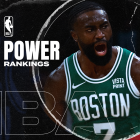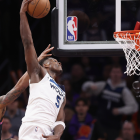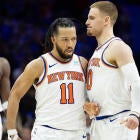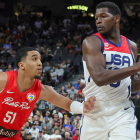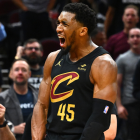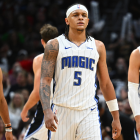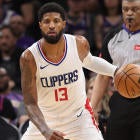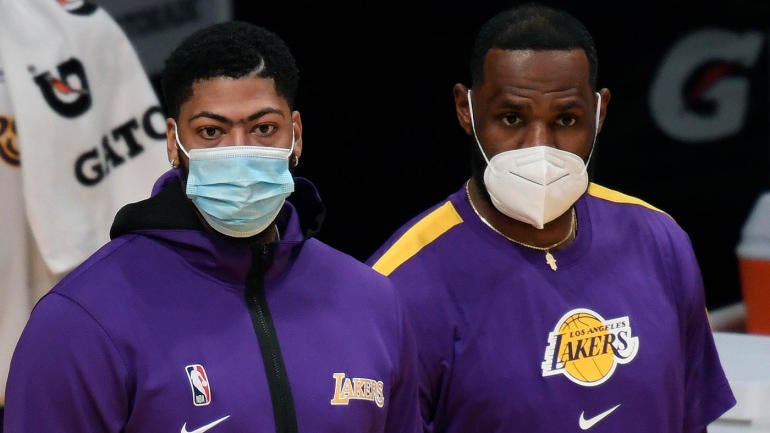
LeBron James took his talents to South Beach. Kevin Durant joined the 73-win Warriors. Kawhi Leonard brought Toronto its first NBA title and immediately bolted for L.A.
There have been a lot of benchmarks for the "player empowerment era" which began in earnest when LeBron uttered those unforgettable words on a nationally televised special in the summer of 2010, but one of the most noticeable trends was a shift away from long-term contracts. Rather than lock themselves into four- or five-year deals, superstars increasingly began to sign what became known as "one-and-one" or "two-plus-one" contracts, short-term deals that became even shorter when players opted out of the final year.
While traditionalists decried the practice as disloyal, the superstars realized the short-term contracts not only maximized their earning potential, but also kept pressure on their franchises to produce a championship contender. If not, free agency was just a heartbeat away.
But this offseason, the trend shifted. LeBron signed a two-year extension with the Lakers that ensures he'll make nearly $44.5 million in the 2022-23 season, when he'll turn 38. Paul George, who could have had plenty of suitors as a free agent next offseason, elected to sign a four-year, $190 million extension with the Clippers. Giannis Antetokounmpo, who had championship contenders chomping at the bit to potentially bring him aboard in 2021, instead inked a $228 million supermax extension, the largest in NBA history, to remain with the Milwaukee Bucks.
Then there's Anthony Davis, who was expected to sign a "two-plus-one" deal with the Lakers, giving him the ability to opt out in the 2022 offseason when his 10 years of NBA service would qualify him for a significantly larger salary. Instead, Davis went the more secure route, signing a five-year, $190 million contract with an option for the final season. The decision could potentially cost Davis around $10 million over the three seasons from 2022-2025, according to CBS Sports' resident capologist, Sam Quinn. But that's if he stays healthy. Davis clearly felt the reward wasn't worth the risk of injury or a sudden decline.
"That could have been a two-year, three-year deal," Davis said after signing the contract. "[But] I have to think about, also, the reality of things, too. I do have a little history with injuries, and a two-year deal, you kind of bet on yourself. ... God forbid, knock on wood, something happens. I want to secure the most amount of years possible and be here long term with this team, so I thought the five-year deal was best for me in my situation."
This certainly makes sense, and those of us making a fraction of what these players take home in a single game check will ask, "what's the difference between $190 million and $200 million?" But $10 million is a lot of money, and in recent years NBA superstars have made it a point to lock in their full value without leaving anything on the table.
It makes you wonder whether all the uncertainty that has come with the COVID-19 pandemic in 2020 has caused players, consciously or unconsciously, to make safer decisions to secure their futures in terms of both finances and happiness.
Dr. Thea Gallagher, an assistant professor at the University of Pennsylvania who serves as the Director of the Outpatient Clinic at the Center for the Treatment and Study of Anxiety, has worked extensively in treating conditions such as post-traumatic stress disorder, social anxiety and panic disorder. Gallagher spoke with CBS Sports about whether the recent decisions from NBA players could be a response to the pandemic and social justice issues that have been omnipresent for the past nine months.
"If your point is about people making safer choices, not knowing what the future is and maybe figuring out what their priorities are, that makes sense to me from a psychological perspective," Gallagher told CBS Sports. "Giving yourself some level of safety and security in a very uncertain world."
Even people in the most stable, secure careers are feeling more pressure than ever to hold onto their jobs. Gallagher cited a Harvard study showing that people are working harder than ever, leading to increased responsibility and stress, without being financially rewarded. In some cases, they're actually being asked to do more for less money. So it makes sense that NBA players, facing a season that will begin mostly without fans in arenas and already having to place a portion of their salary in an escrow account, would be more likely to take a deal presented to them this offseason rather than wait for a bigger payday down the road.
"I definitely think with the fear and the pandemic and people just not knowing what the future's going to bring, it makes sense that people are going to play it safer," Gallagher told CBS Sports. "Because when you don't know, you kind of have a tendency to hold back a bit."
Gallagher, a rabid Philadelphia sports fan, likened the situation to one we often see in competition, when a team gets ahead and starts playing more conservatively than it did to build the lead in the first place. A basketball team will use more of the shot clock on each possession. A football team will call more running plays. A tennis player will take fewer risks. People who have positive things in their life right now want to hang onto them, rather than face the prospect of losing them in an unpredictable way.
For NBA players, the fear and anxiety that comes with potentially contracting COVID-19 is coupled with the pressure to comply with all of the league's protocols for navigating the season safely, issued in the form of a 134-page guide prior to the start of the 2020-21 season. The bubble experiment over the summer was an unquestioned success, but now teams will be traveling to different cities in a sport which requires an extreme amount of physical contact and is always played indoors.
Even with the new hope of vaccines, the start of the NBA season coincides with the largest number of coronavirus cases that the U.S. has seen, while states and counties are rolling back into full lockdowns. Gallagher says the overarching pressure of potentially being responsible for a game cancellation, or even the suspension of the entire league, could wear on players as the season goes on.
"If one person could potentially shut down the NBA, at least for a little while, that impacts other people's bottom line, maybe their finances ultimately," Gallagher told CBS Sports. "I think there's a lot of pressure and I think it does seem like some people, there's a little bit less care about the virus or what people are doing socially. It seems like without the bubble, the NBA could be a new stress bubble, in a way."
Frank Snowden, a historian of pandemics at Yale University, warns of a second pandemic coming -- "a psychological pandemic" that affects mental health in the wake of COVID-19. A study from neuroscientists Francis McGlone and Merle Fairhurst begun in May found that a lack of physical contact with others, particularly among young people, is contributing to depression, sadness and lower energy levels. With these significant mental health risks coming with the start of the new NBA season, it makes sense that players would not want the added stress of impending contract discussions or the fear of an injury derailing their financial future. When you look at it this way, you can see why superstars chose to play it safe by signing long-term deals this offseason.
"It's about people shifting their perspective, shifting their priorities, making sacrifices," Gallagher told CBS Sports. "But then also realizing this isn't going to last forever, and can I suffer in the short term to have long-term gains?"














